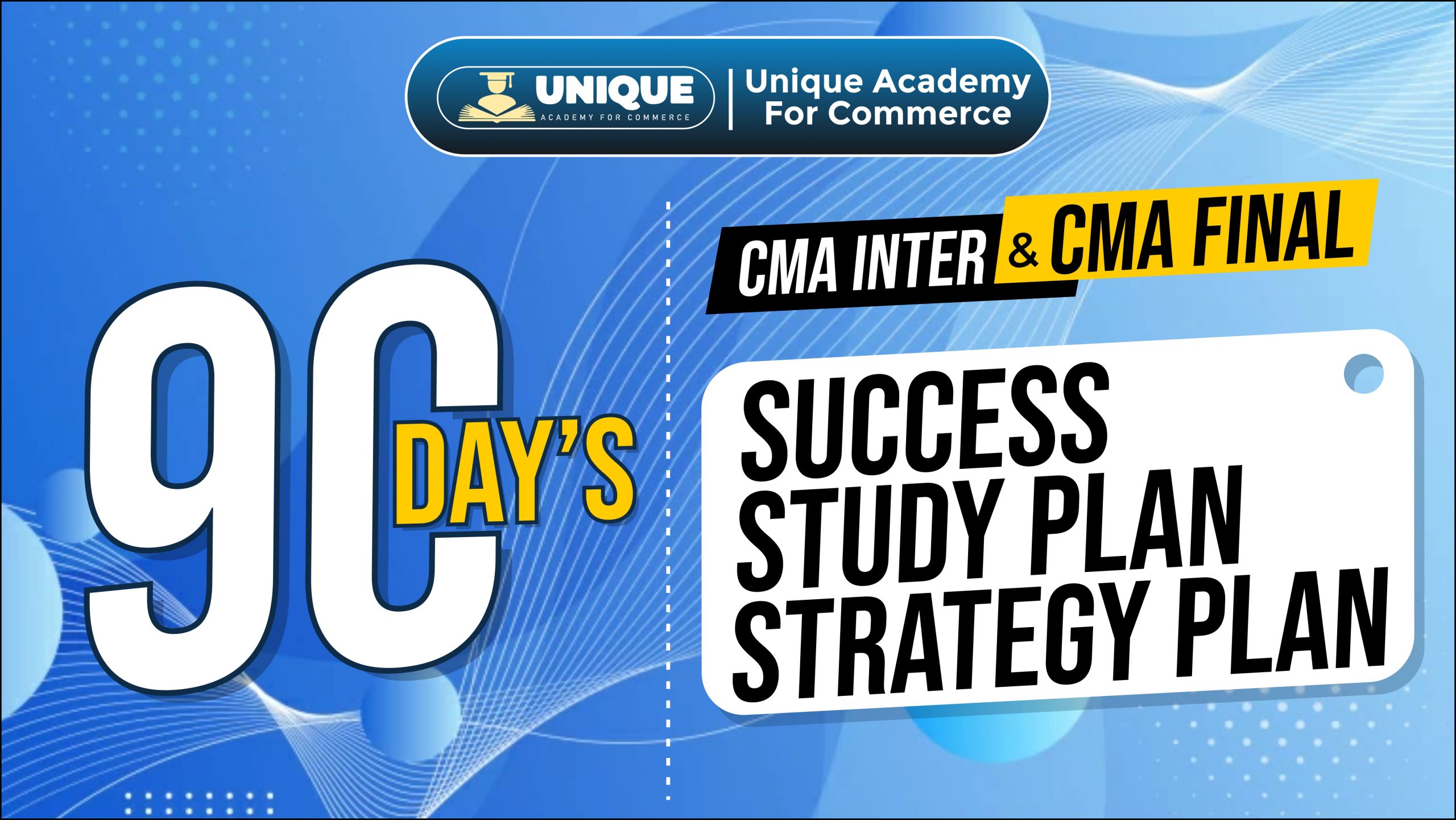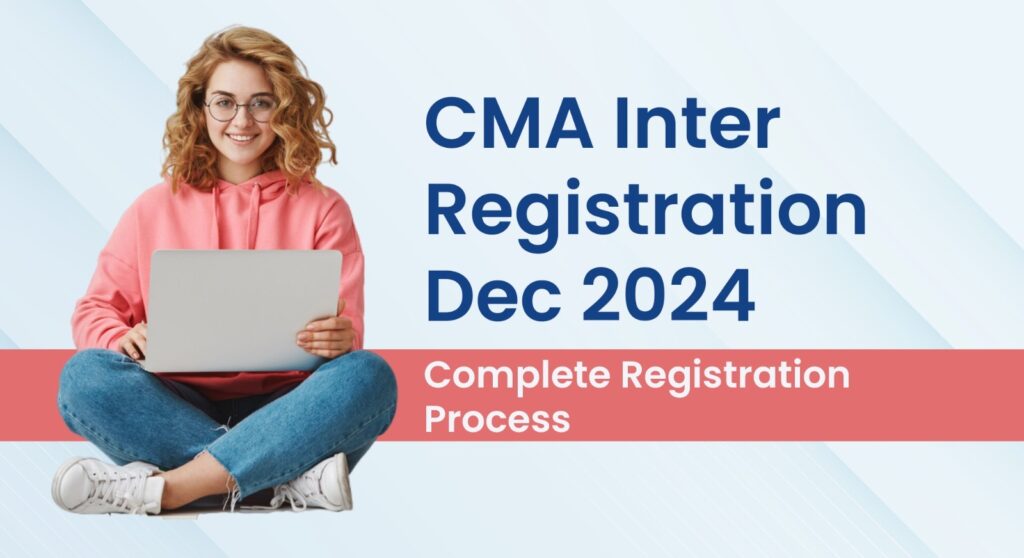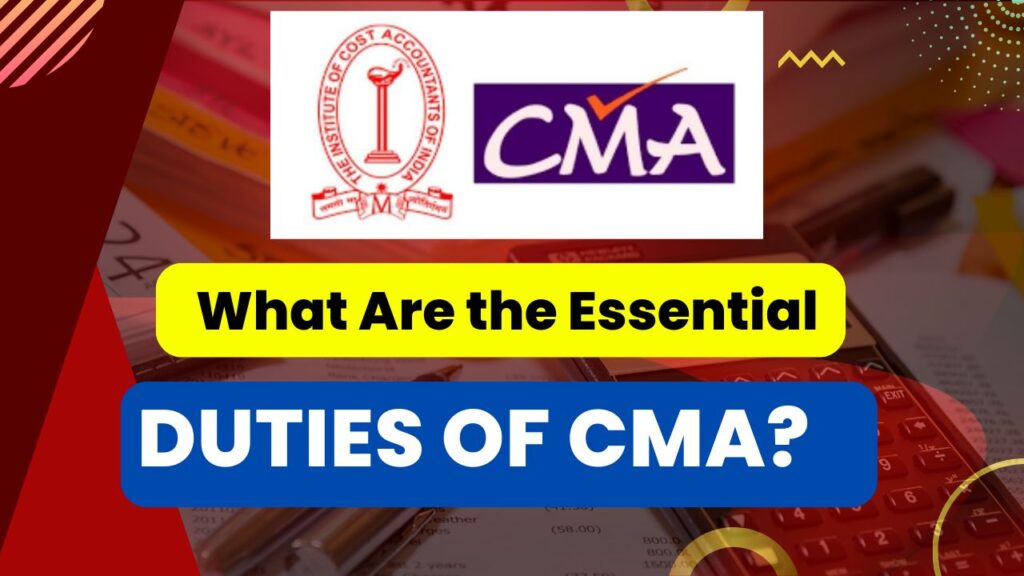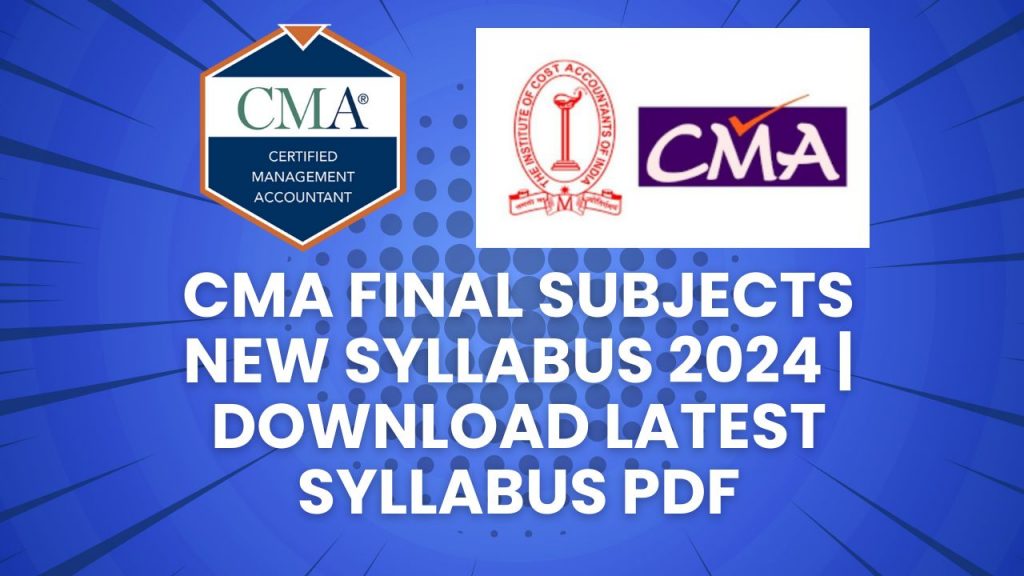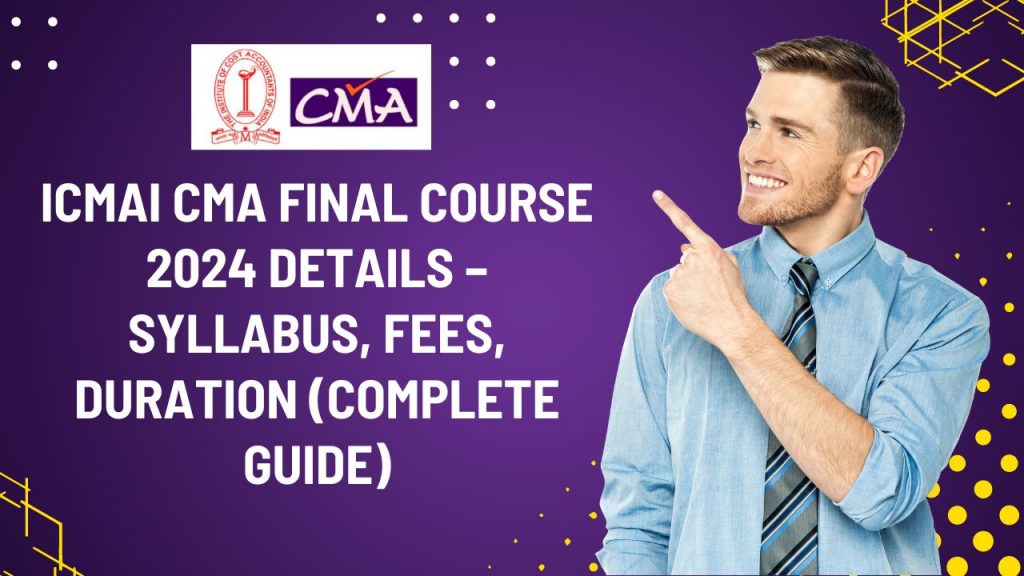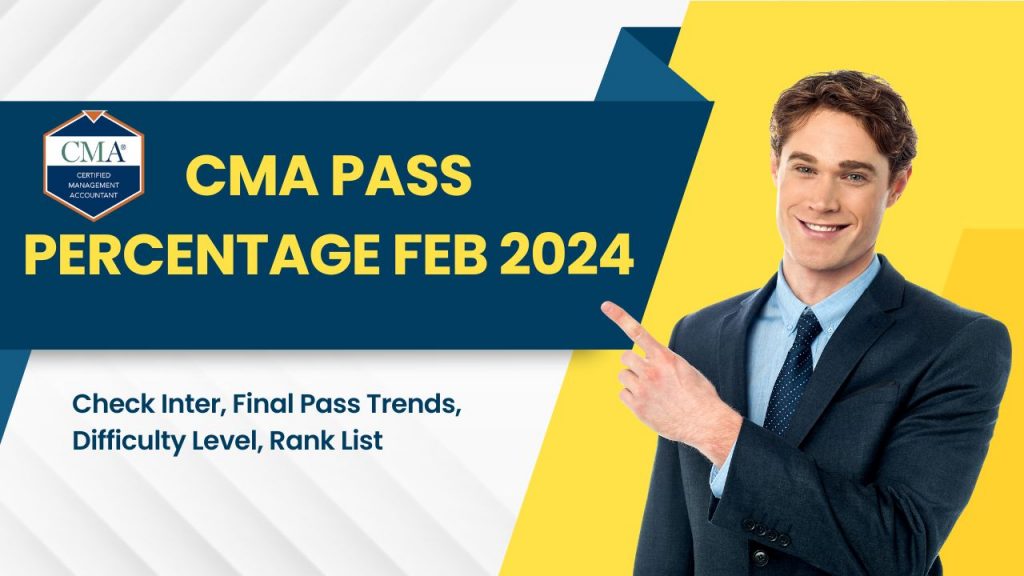Cost Management Accounting is a national level examination. Students are more inclined in understanding the concepts of costing and management accounting and applying them in the practical work of field, they usually opt for this course instead of Company Secretary or Chartered Accountancy Course.
- The different stages of examination includes the following-
- Study Plan for CMA Examination
- Study Plan for CMA Examination
- 1. Ensure complete understanding of the CMA Study Material
- 2. Practice of making notes
- 3. Start with a proper Time Table
- 4. Setting targets
- 5. Analysing the actual performance very week
- 6. Never Do following-
- Understanding Syllabus of CMA Intermediate 2023
- Syllabus – 2022: Intermediate Course Curriculum
- Syllabus – 2016: Intermediate Course Curriculum
The different stages of examination includes the following-
- Foundation Programme
- CMA Intermediate Programme
- CMA Final Programme
CMA Inter is the second stage of the professional course of Cost Accountancy. The Inter stage is basically designed to inculcate skills and competence of Inter program passed students. The main objective is to make students capable and competent to act as Costing Executive in companies or in professional and consultancy firms).
Study Plan for CMA Examination
At the outset, every student has to ensure following-
- Proper timetable allotting required time for each subject is required to be made
- Complete and primary focus should be on the institute’s study material
- Frequent and proper revision of the entire syllabus at least 3-4 times is a must.
- Making summary notes for all the subjects for quick revision
- Practice a lot of MCQs to maintain speed and accuracy for the objective type question papers
- Regular practice of attempting Previous Year Question Papers will help in analyzing the trend of Examination.
- If required , the students can also enrol for the test series. It will help in time management and practice.
Study Plan for CMA Examination
1. Ensure complete understanding of the CMA Study Material
The Institute provides study material for the candidates preparing for CMA exam. Go through those study materials along with some reference books as recommended by experts. Conceptual understanding and correlations among various topics are the best strategies you can adopt while preparing for theoretical topics because everything is correlated. Don’t focus on memorizing, but understanding and analyzing the topic.
2. Practice of making notes
While studying the chapters make short and handy notes of the topics. This will not only help in noting down the important points but also help in remembering the topics for the future. Keep a small notebook handy while studying a new chapter. Focus on writing for theoretical subjects. It will not only improve the writing speed but also help remember the topics easily. Practice as much as you can before the exams, do the writing instead of just learning formulas.
3. Start with a proper Time Table
Prepare a timetable or study routine so that all the CMA Syllabus is covered within a given time period. It is necessary to dedicate most of the time to CMA exam preparation. The aim should be to complete one chapter at a time. After doing that, refer to the practice manual, scanner, and gauge if the coverage is maximum.
Time tables can be made on a weekly or monthly basis with breakups in between.
4. Setting targets
Set targets for a day that is achievable. Do not set such targets which are impossible to achieve. It will only lead to exam burden and not help in any way. Aspirants must try to finish the entire syllabus at least three months before the main exam. One and a half months should be dedicated for revision. During the revision phase-only go through the previous chapters which are completed, and focus on improving the weaknesses
5. Analysing the actual performance very week
Analyze every week’s target and check if there are any backlogs. Monitor the effort put in and revise the schedule accordingly.
6. Never Do following-
- Never go with selective topics, go through each and every concepts and chapter thoroughly.
- Never refer old study material. Before every attempt, you can find all the supplements, practice paper, CMA Study Material, amendment of all sorts in every subject
- Try to finish your revision beforehand, do not leave anything undone or partly done. Time management is the key.
Understanding Syllabus of CMA Intermediate 2023
The Institute has prescribed detailed syllabus w.r.t. each paper and content which will be part of the test. Following are the topics and subjects which are required to be part of the test. Students are expected to understand and have a proper grip on the topics.
A proper SWOT analysis should be done by the students w.r.t. topics. The focus should be more on the topics/ subjects which seems tough or difficult for them.
| Syllabus – 2022: Intermediate Course Curriculum | Syllabus – 2016 Intermediate Study Material |
| GROUP – I PAPER 5: BUSINESS LAWS AND ETHICS (BLE) PAPER 6: FINANCIAL ACCOUNTING (FA) PAPER 7: DIRECT AND INDIRECT TAXATION (DITX) PAPER 8: COST ACCOUNTING (CA)GROUP – IIPAPER 9: OPERATIONS MANAGEMENT AND STRATEGIC MANAGEMENT (OMSM) PAPER 10: CORPORATE ACCOUNTING AND AUDITING (CAA) PAPER 11: FINANCIAL MANAGEMENT AND BUSINESS DATA ANALYTICS (FMDA) PAPER 12: MANAGEMENT ACCOUNTING (MA) | Paper-5 Financial Accounting Paper-6 Laws and Ethics Paper-7 Direct Taxation Revised Edition January 2023 Paper-8 Cost Accounting Paper-9 Operations Management & Strategic Management Paper-10 Cost & Management Accounting and Financial Management Paper-11 Indirect Taxation Revised Edition January 2023 Paper-12 Company Accounts & Audit |
Syllabus – 2022: Intermediate Course Curriculum
| Intermediate Course (Group – I) | Paper 5 BUSINESS LAWS AND ETHICS (BLE) |
| Section A: Commercial Laws | Introduction to Law and Legal System in IndiaIndian Contracts Act, 1872Sale of Goods Act, 1930Negotiable Instruments Act, 1881Indian Partnership Act, 1932Limited Liability Partnership Act, 2008 |
| Section B: Industrial Laws | Factories Act, 1948Payment of Gratuity Act, 1972Employees Provident Fund and Miscellaneous Provisions Act, 1952Employees State Insurance Act, 1948The Code on Wages, 2019 |
| Section C: Corporate Laws | Companies Act, 2013 |
| Section D: Business Ethics | Business Ethics and Emotional Intelligence |
| Intermediate Course (Group – I) | Paper 6 FINANCIAL ACCOUNTING (FA) |
| Section A: Accounting Fundamentals | Accounting Fundamentals |
| Section B: Accounting for Special Transactions | Bills of Exchange, Consignment, Joint Venture |
| Section C: Preparation of Financial Statements | Preparation of Final Accounts of Commercial Organisations,Not-for-Profit Organisations and from Incomplete Records |
| Section D: Partnership Accounts | Partnership Accounts |
| Section E: Lease, Branch and Departmental Accounts etc. | Lease AccountingBranch (including Foreign Branch) and Departmental AccountsInsurance Claim for Loss of Stock and Loss of ProfitHire Purchase and Installment Sale Transactions |
| Section F: Accounting Standards | Accounting Standards |
| Intermediate Course (Group – I) | Paper 7 DIRECT AND INDIRECT TAXATION (DITX) |
| Section A: Direct Taxation | Basics of Income Tax Act Heads of Income Total Income and Tax Liability of Individuals & HUF |
| Section B: Indirect Taxation | Concept of Indirect Taxes Goods and Services Tax (GST) Laws Customs Act |
| Intermediate Course (Group – I) | Paper 8 COST ACCOUNTING (CA) |
| Section A: Introduction to Cost Accounting | Introduction to Cost Accounting Cost Ascertainment – Elements of Cost Cost Accounting Standards (CAS 1 to CAS 24)Cost Book Keeping |
| Section B: Methods of Costing | Methods of Costing |
| Section C: Cost Accounting Techniques | Cost Accounting Techniques |
| Intermediate Course (Group – II) | Paper 9 OPERATIONS MANAGEMENT ANDSTRATEGIC MANAGEMENT (OMSM) |
| Section A: Operations Management | Introduction Operations Planning Designing of Operational Systems and Control Application of Operation Research – Production Planning and Control Productivity Management and Quality Management Project Management, Monitoring and Control Economics of Maintenance and Spares Management |
| Section B: Strategic Management | Introduction Strategic Analysis and Strategic Planning Formulation and Implementation of Strategy Digital Strategy |
| Intermediate Course (Group – II) | Paper 10 CORPORATE ACCOUNTING AND AUDITING (CAA) |
| Section A: Corporate Accounting | Accounting for Shares and Debentures Preparation of the Statement of Profit and Loss and Balance Sheet (As Per Schedule III of Companies Act, 2013)Cash Flow Statement Accounts of Banking, Electricity and Insurance Companies Accounting Standards |
| Section B: Auditing | Basic Concepts of Auditing Provisions Relating to Audit under Companies Act, 2013Auditing of Different Types of Undertakings |
| Intermediate Course (Group – II) | Paper 11 FINANCIAL MANAGEMENT ANDBUSINESS DATA ANALYTICS (FMDA) |
| Section A: Financial Management | Fundamentals of Financial Management Institutions and Instruments in Financial Markets Tools for Financial Analyses Sources of Finance and Cost of Capital Capital Budgeting Working Capital Management Financing Decision of a Firm |
| Section B: Business Data Analytics | Introduction to Data Science for Business Decision-making Data Processing, Organisation, Cleaning and Validation Data Presentation: Visualisation and Graphical Presentation Data Analysis and Modelling |
| Intermediate Course (Group – II) | Paper 11 FINANCIAL MANAGEMENT ANDBUSINESS DATA ANALYTICS (FMDA) |
| Section A: Financial Management | Fundamentals of Financial Management Institutions and Instruments in Financial Markets Tools for Financial Analyses Sources of Finance and Cost of Capital Capital Budgeting Working Capital Management Financing Decision of a Firm |
| Section B: Business Data Analytics | Introduction to Data Science for Business Decision-making Data Processing, Organisation, Cleaning and Validation Data Presentation: Visualisation and Graphical Presentation Data Analysis and Modelling |
| Intermediate Course (Group – II) | Paper 12 MANAGEMENT ACCOUNTING (MA) |
| Section A: Introduction to Management Accounting | Introduction to Management Accounting |
| Section B: Activity Based Costing | Activity Based Costing |
| Section C: Decision Making Tools | Marginal Costing Applications of Marginal Costing in Short Term Decision Making Transfer Pricing |
| Section D: Standard Costing and Variance Analysis | Standard Costing and Variance Analysis |
| Section E: Forecasting, Budgeting and Budgetary Control | Forecasting, Budgeting and Budgetary Control |
| Section F: Divisional Performance Measurement | Divisional Performance Measurement |
| Section G: Responsibility Accounting | Responsibility Accounting |
| Section H: Decision Theory | Decision Theory |
Syllabus – 2016: Intermediate Course Curriculum
| Intermediate Course (Group – I) | Paper 05 FINANCIAL ACCOUNTING |
| Section A: Accounting – Basics | 1. Fundamentals of Accounting 2. Accounting for Special Transactions |
| Section B: Preparation of Financial Statements | 3. Preparation of Final Accounts of Profit Oriented organizations, Non-Profit Organizations and from Incomplete Records. 4. Partnership Accounts |
| Section C: Self Balancing Ledgers, Royalties, Hire Purchase & Installment System, Branch & Departmental Accounts | 5. Self-Balancing Ledgers 6. Royalties, Hire-Purchase and Installment System 7. Branch and Departmental Accounts |
| Section D: Accounting in Computerised Environment and Accounting Standards | 8. Overview of Computerised Accounting 9. Accounting Standards (Specified only) |
| Intermediate Course (Group – I) | Paper 06 LAWS & ETHICS |
| Section A: Commercial Laws | 1. Laws of Contracts (Advanced level) 2. Laws relating to Sale of Goods (Advanced level) 3. Negotiable Instruments Act,1881 (Advanced Level) 4. Indian Partnership Act, 1932 5. Limited Liability Partnership Act, 2008 |
| Section B: Industrial Laws | 6. Factories Act, 19487. Payment of Gratuity Act, 19728. Employees Provident Fund and Miscellaneous Provisions Act, 19529. Employees State Insurance Act, 194810. Payment of Bonus Act, 196511. Minimum Wages Act, 194812. Payment of Wages Act, 193613. Pension Fund Regulatory and Development Authority Act, 2013 |
| Section C: Corporate Laws | 14. Companies Act, 2013 |
| Section D: Ethics | 15. Business Ethics |
| Intermediate Course (Group – I) | Paper 07 DIRECT TAXATION |
| Section A: Income Tax Act Basics | 1. Introduction to Income Tax Act, 19612. Income which do not form part of Total Income (Section 10, 11 to 13A) |
| Section B: Heads of Income and Computation of Total Income and Tax Liability | 3. Heads of Income and Computation of Total Income under various heads4. Clubbing Provisions, Set off and Carry forward of Losses, Deductions5. Assessment of Income and tax liability of different persons |
| Section C: Tax Management, Administrative Procedures and ICDS | 6. TDS, TCS and Advance Tax7. Administrative Procedures8. ICDS |
| Section D: Ethics | 15. Business Ethics |
| Intermediate Course (Group – I) | Paper 08 COST ACCOUNTING |
| Section A: Introduction to Cost Accounting | A. Cost Ascertainment – Elements of Cost B. Cost Accounting Standards C. Cost Book Keeping |
| Section B: Methods of Costing | Methods of Costing |
| Section C: Cost Accounting Techniques | Cost Accounting Techniques |
| Intermediate Course (Group – II) | Paper 09 OPERATIONS MANAGEMENT &STRATEGIC MANAGEMENT |
| Section A: Operations Management | 1. Operations Management – Introduction 2. Operations Planning 3. Designing of Operational Systems and control 4. Production Planning and control 5. Productivity management and quality management6. Project Management 7. Economics of Maintenance and Spares management |
| Section B: : Strategic Management | 8. Strategic Management Introduction 9. Strategic Analysis and Strategic Planning 10. Formulation and Implementation of Strategy |
| Intermediate Course (Group – II) | Paper 10 COST & MANAGEMENT ACCOUNTING AND FINANCIAL MANAGMENT |
| Section A: Cost & Management Accounting | 1. Cost and Management Accounting – Introduction 2. Decision Making Tools 3. Budgeting and Budgetary Control 4. Standard Costing and Variance Analysis 5. Learning Curve |
| Section B: : Financial Management | 6. Introduction to Financial Management 7. Tools for Financial Analysis and Planning 8. Working Capital Management 9. Cost of Capital, Capital Structure Theories, Dividend Decisions and Leverage Analysis 10. Capital Budgeting – Investment Decisions |
| Intermediate Course (Group – II) | Paper 11 INDIRECT TAXATION |
| Section A: Canons of Taxation – Indirect Tax GST | Introduction Levy and Collection of Tax Levy and Collection of TaxInput Tax Credit (ITC)Registration under GSTTax Invoice, Credit and Debit Notes and Other Documents under GSTAccounts and Records under GSTPayment of TaxTDS and TCS under GSTReturns under GSTMatching Concept under GSTAudit under GSTE-waybills under GST |
| Section B: CUSTOMS LAWS | Customs Law – Basic ConceptsTypes of DutiesValuation under CustomsImport & Export ProceduresCustoms Rules, 2017 |
| Intermediate Course (Group – II) | Paper 12 COMPANY ACCOUNTS & AUDIT |
| Section A: Accounts of Joint Stock Companies | 1. Accounting of Shares and Debentures2. Presentation of Financial Statements (as per Schedule III) 3. Cash Flow Statement4. Accounts of Banking, Electricity and Insurance Companies 5. Accounting Standards (AS – 11, 12, 15, 16, 17, 18 and 19) |
| Section B: Auditing | 6. Auditing Concepts7. Provision relating to Audit under Companies Act |
| Paper No. | Paper Name | Section | Weight |
| 13. | Corporate andEconomic Laws | Section A: Corporate Laws | 60% |
| Section B: Economic Laws and Regulations | 40% | ||
| 14. | Strategic FinancialManagement | Section A: Investment Decisions | 25% |
| Section B: Security Analysis and PortfolioManagement | 35% | ||
| Section C: Financial Risk Management | 20% | ||
| Section D: International Financial Management | 15% | ||
| Section E: Digital Finance | 5% | ||
| 15. | Direct Tax Lawsand InternationalTaxation | Section A: Direct Tax Laws | 60% |
| Section B: International Taxation | 40% | ||
| 16. | Strategic CostManagement | Section A: Strategic Cost Management forDecision Making | 60% |
| Section B: Quantitative Techniques in DecisionMaking | 40% | ||
| 17. | Cost andManagement Audit | Section A: Cost Audit | 50% |
| Section B: Management Audit | 25% | ||
| Section C: Internal Control, Internal Audit,Operational Audit and Other Related Issues | 15% | ||
| Section D: Forensic Audit and Anti-MoneyLaundering | 10% | ||
| 18. | Corporate FinancialReporting | Section A: Indian Accounting Standards | 25% |
| Section B: Valuation of Shares, Accounting andReporting of Financial Instruments and NBFCs | 15% | ||
| Section C: Accounting for Business Combinationsand Restructuring (in Compliance with Ind ASs) | 20% | ||
| Section D: Consolidated Financial Statements andSeparate Financial Statements (in Compliance with Ind ASs) | 20% | ||
| Section E: Recent Developments in FinancialReporting | 10% | ||
| Section F: Government Accounting in India | 10% | ||
| 19. | Indirect Tax Lawsand Practice | Section A: Goods and Services Tax Act and Rules | 70% |
| Section B: Customs Act and Rules | 30% | ||
| 20A | StrategicPerformanceManagement andBusiness Valuation | Section A: Strategic Performance Management | 50% |
| Section B: Business Valuation | 50% | ||
| 20B | Risk Managementin Banking andInsurance | Section A: Risk Management in Banking | 60% |
| Section B: Risk Management in Insurance | 40% | ||
| 20C | Entrepreneurshipand Startup | Section A: Entrepreneurial Skill Sets | 15% |
| Section B: The Entrepreneurial Eco-system | 15% | ||
| Section C: Idea to Action | 15% | ||
| Section D: Value Addition | 15% | ||
| Section E: Scale up | 10% | ||
| Section F: Risk Management Strategies | 10% | ||
| Section G: Leadership | 10% | ||
| Section H: Types of New Age Business | 10% |




